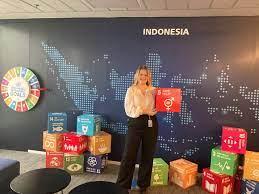
https://www.unv.org/Success-stories/working-towards-gender-responsivenes...
The vision of the Lab is to be a leading innovative finance platform that cooperates closely with the government and all stakeholders, international and national, to share knowledge and expertise to showcase best practices globally.
UNDP’s primary mandate is to eradicate poverty and reduce inequalities through sustainable development. Charlotte’s assignment is focused on these two mandates, which she examines through a gender lens. She works with gender mainstreaming and gender-responsive climate finance under the Sustainable Development Finance workstream.
UNDP is committed to advancing equality between men and women through our programmes, projects and policies. In our effort to harness innovative solutions for sustainable development, we cannot leave women, their capacities and knowledge behind, as all available resources are needed to achieve 2030 Agenda. --Muhammad Didi Hardiana, head of the Innovative Financing Lab at UNDP Indonesia and Charlotte’s supervisor
Climate change isn’t gender neutral, but rather enhances already existing inequalities. That’s why a gender analysis is of high importance when planning and implementing climate change mitigation and adaptation projects. --Charlotte German
“Women tend to be more reliant on natural resources for their livelihood, as well as responsible for the household’s water and food intake," Charlotte explains. "Many women, especially in rural areas, work in agriculture or agroforestry, which gives them a deep and unique understanding of nature and ecosystems, which is crucial for climate change mitigation activities. There cannot be any climate justice without gender equality and there cannot be any gender equality without climate justice."
To promote this practice, Charlotte’s team supports the implementation of co-tagging in the domestic planning and budgeting system KRISNA, where both climate and gender can be tagged to government related outputs. By ensuring that several ministries implement gender-responsive planning and budgeting practices, the issue of gender equality becomes more centered and harder to ignore.
In 2021, they developed technical guidance on gender-responsive climate budgeting to provide step-by-step guidance on how to implement the tagging of gender-responsive climate change programmes into the national planning and budgeting system.
It provides ministries with methods to conduct gender analysis using the Gender Analysis Pathway and compiling a Gender Budget Statement. Additionally, the technical guidance highlights the correlation between climate change and gender equality and how dual benefit can be achieved by using an integrated budgeting and planning approach.
Charlotte started her assignment with a clear gender focus. In June 2022, when her assignment ended after two years of service, she had worked extensively on climate finance and innovative finance solutions as well. She believes that the assignment fulfilled its purpose of providing not only practical experience in her field of interest, but also gave her the opportunity to explore other thematic areas and develop professionally.
A keen interest in gender equality and women’s rights are the reasons why Charlotte pursued a Bachelor’s degree in gender studies and a Master’s degree in international development. On the side, she completed several internships related to eliminating violence against women and girls and promoting sexual and reproductive health and rights.
Whilst writing her Master’s thesis in gender and development, she learned about the United Nations Volunteers (UNV) programme from a friend. They both paused their heavy reading session to create a profile on the UNV platform.
Charlotte felt that volunteering with the UN would provide an opportunity to gain practical experience in her field of interest, while also acting as a stepping-stone into her professional life.
Upon learning that there was an opening for an assignment with UNDP Indonesia, focusing on gender-responsive climate finance, she had to take the chance. "Growing up, my mom always told me, "One day, you will be protesting for women’s rights," she shares. "My assignment with UNV enabled me to do just that."
This article was prepared with the kind support of Online Volunteer Kathakali Das Bhaumik.










Add new comment